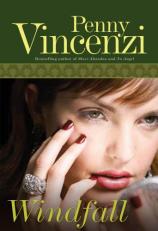Windfall
Review
Windfall
In the mid-1930s, all of England --- especially the jet-setting
upper class that brushes elbows with royalty on occasion --- is
abuzz with rumors of the new young king, Edward VIII, and his
scandalous relationship with the American divorcee, Wallis Warfield
Simpson, a love affair that will create a constitutional crisis and
ultimately result in Edward’s abdication of the throne.
This real-life historical drama lies in the background of
WINDFALL, Penny Vincenzi’s latest book to be released in the
United States (it was originally published in the United Kingdom in
1997). The royal crisis underscores several of the novel’s
themes, most notably the transition between a
“traditional” understanding of marriage and sexuality
to one that more closely resembles our modern views. Vincenzi also
explores the life-altering conflict between desire and duty and how
it seems that a person can have one or the other, but never
both.
Cassia Tallow, the complex heroine of WINDFALL, discovers her
own conflict between duty and desire almost as soon as the novel
opens when Cassia receives a large inheritance from her recently
deceased godmother whom she had thought was penniless. She is now
rich beyond her wildest dreams. At first, Cassia is drawn to the
expected luxuries: a fancy sports car and chic clothes that she, as
the mother of three young children and wife of a humble country
doctor, could never have afforded before.
Soon, however, Cassia sets her sights somewhat higher as she
realizes that this unexpected wealth might enable her to revive her
own dreams of becoming a practicing physician, dreams that were
thwarted when an unexpected pregnancy and reluctant marriage put an
end to her promising medical school career. But her husband,
Edward, who struggled to pass medical school, grows increasingly
resentful of Cassia’s aspirations. He initiates a war of
passive aggression that escalates when Cassia rents a house in
London and when Edward sends their oldest son, only six years old,
to boarding school.
Meanwhile, Cassia’s medical work near London has brought
her back into the fashionable crowd with whom she associated in her
younger, unmarried days. These include the second-rate actor Rupert
Cameron, her oldest friend and first love, and the maddeningly
stubborn and rakishly attractive Harry Moreton, who has long
professed his alternating passion for and annoyance with Cassia.
Fueled by her new financial independence, Cassia finds herself
making questionable choices that could affect not only her friends
but also her entire family. And, to complicate matters, Cassia soon
starts to suspect that the inheritance from her godmother might not
be quite what it seems, and it could even have a few strings
attached.
WINDFALL starts by focusing quite exclusively on Cassia’s
own story, beginning with her discovery of the inheritance and,
through a series of flashbacks, introducing readers to the
character’s history. As the novel does so, however, it also
broadens gradually to encompass a dozen or more of Cassia’s
friends and acquaintances, each of whom has his or her own story to
be explored. Vincenzi manages to create the kind of broad,
panoramic canvas she loves to paint, as marriages are threatened
and destroyed, individuals come to the brink of despair or reinvent
themselves in new and surprising ways, and the inevitable happy
(but sometimes bittersweet) endings come into view.
Vincenzi excels at depicting the upper classes, at describing
their elegant clothes and homes, their lavish parties, and also
their petty squabbles. Here, though, she goes beyond mere idolatry
of the rich, as she contrasts their internal dramas with the far
more dire circumstances facing lower- and working-class women like
the ones Cassia treats at her birth control clinics. She also
explores conflicted and changing ideas of sexuality as they existed
in the 1930s, depicting both characters who freely convey their
era’s prejudices and those who are beginning to adopt more
modern attitudes.
However, at the center of it all is Cassia, one of
Vincenzi’s most complicated and compelling heroines. Despite
her numerous ethically questionable choices, Cassia remains a
genuinely sympathetic character, especially for modern women
readers who will rejoice that the available choices for ambitious
women have come so far from Cassia’s time.
Reviewed by Norah Piehl on January 24, 2011
Windfall
- Publication Date: October 1, 2009
- Hardcover: 624 pages
- Publisher: Overlook Hardcover
- ISBN-10: 1590202473
- ISBN-13: 9781590202470





